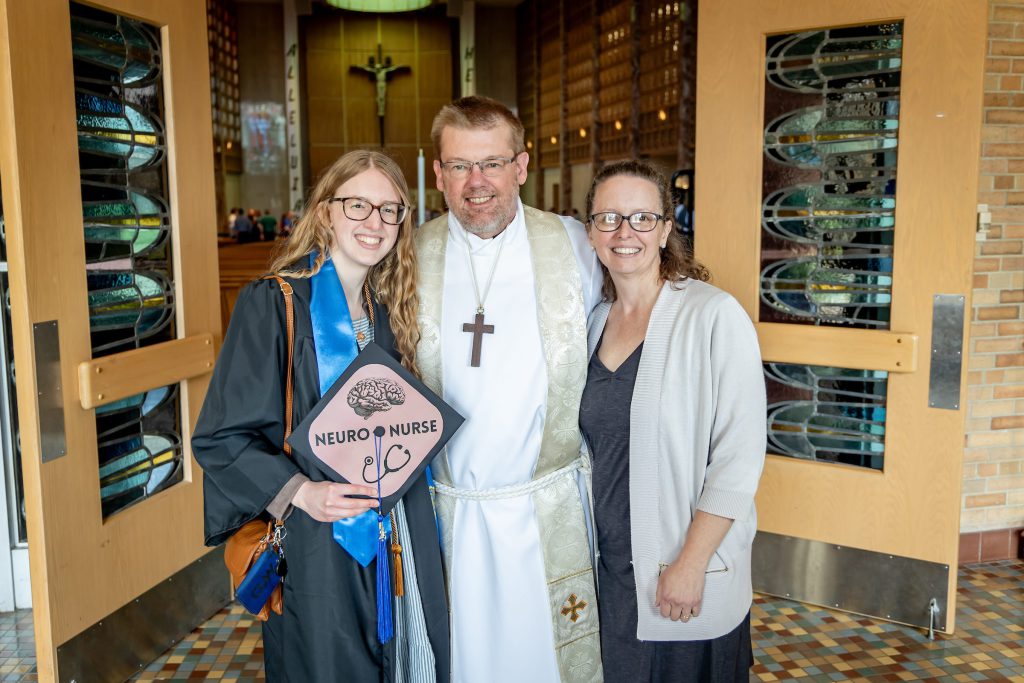Credits
76
Our OT program offers multiple pathways for you to earn a graduate degree in Occupational Therapy, including an accelerated bachelor's and an OT bridge program.
Concordia's OT program makes stepping forward in your calling as an occupational therapist attainable no matter where you are in your journey. Our multiple program pathways and hybrid course formatting will prepare you holistically through our faith-based, student-centered curriculum, and diverse, hands-on, clinical experiences. You'll graduate ready to help your patients thrive in a variety of settings.
Virtual TourThe mission of Concordia University’s Master of Occupational Therapy program is to positively impact communities by developing Christ-centered occupational therapists who empower others to reach their highest potential through leadership, best practice, advocacy, and innovation. The video below contains testimonials from both faculty and students about how Concordia incorporates faith into the classroom.
Our multiple tracks, hybrid formatting, and various articulation agreements enable us to meet you where you’re at based on your educational background:
Our full-time graduate OT program is taught in a blended format, allowing you to interact with your classmates and professors online and in person. Online coursework allows student flexibility and in-person coursework focuses on active learning and/or laboratory experiences. You’ll begin working with clients in your first year, and our curriculum offers plenty of exposure to diverse, real-world scenarios that will test your knowledge and put theory into practice.
The Master of Occupational Therapy program is accredited by the Accreditation Council for Occupational Therapy Education (ACOTE) of the American Occupational Therapy Association (AOTA), located at 7501 Wisconsin Avenue, Suite 510E Bethesda, MD 20814. ACOTE’s telephone number c/o AOTA is (301) 652-6611 and its Web address is www.acoteonline.org.
Program data specific to Concordia University Wisconsin on the National Board for Certification in Occupational Therapy (NBCOT) Exam can be found here.
Facebook Linkedin YoutubeAt Concordia, you’ll develop the skills necessary to enable people to improve their participation in their day-to-day activities.
By combining classroom, laboratory, and supervised clinic-based instruction, our occupational therapy courses train you dynamically, ensuring your preparedness for the variety of scenarios you'll encounter in your career as an OTR. As a student, you’ll have multiple opportunities for client contact, ranging from children to older adults, school systems to factories, and acute care to community wellness programs. Some of these experiences are clinical fieldwork placements, while others are client evaluation and consultation in a classroom or community setting. All students must complete 24 weeks of Level II fieldwork within 24 months following the completion of the didactic portion of the program.
Students should expect to pay the tuition and fees as noted on the Tuition & Fees tab.
Graduates of Concordia's occupational therapy programs are eligible to sit for their national examinations to become OTRs. Learn more about our program outcomes and the OTR licensure/certification process on the outcomes tab.
What I appreciate most about this occupational therapy program is the extensive support, resources, and guidance provided by my professors. Given that this program is predominantly online, it is crucial to have educators who possess specific qualities to compensate for the absence of face-to-face interactions typical of traditional classes. These attributes consist of efficient communication, immediate response to student questions, clear and well-structured presentation of course content, availability for virtual meetings or consultations, willingness to give constructive feedback on assignments, and the capability to support an interactive online learning atmosphere. Overall, I wholeheartedly recommend this program to any practicing COTA seeking unique opportunities to enhance their expertise, skills, and professional scope within our dynamic and fulfilling field.

Across Wisconsin and the nation, healthcare systems are facing a critical workforce shortage. Concordia University Wisconsin is helping meet this urgent need by preparing 388 healthcare graduates in the class of 2025 who are ready to serve where they are most needed. Read More
When the Wisconsin winter sets in, icy sidewalks, freezing temperatures, and limited mobility can...
Congratulations to CUW's September Students of the Month, Carolyn Bourgeault and Andrew...
Occupational Therapy faculty member Bobbie Vergo has partnered with Concordia’s Human...
Imagine a space buzzing with collaborative energy as OT and PT students worked side-by-side,...
Our team is standing by to assist you with additional program details, financial aid options, and admissions questions.
Loading...